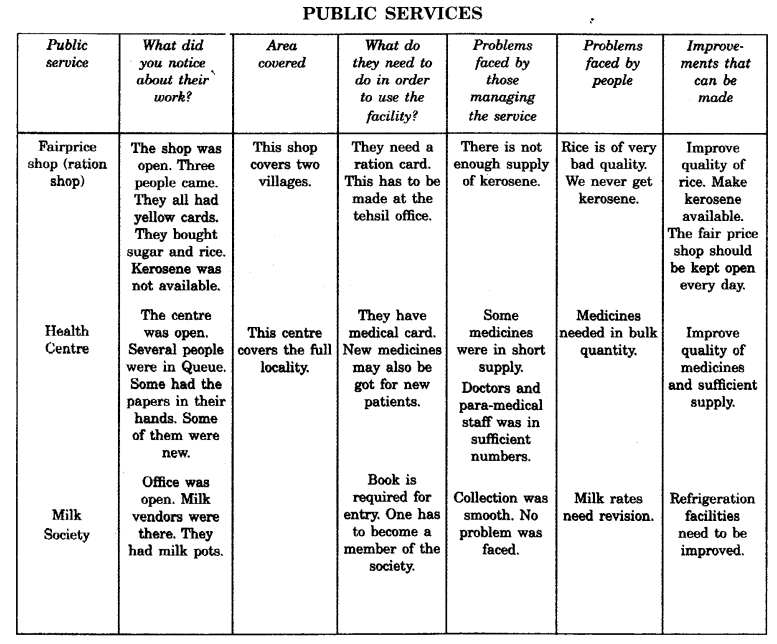GetStudySolution
Getstudysolution is an online educational platform that allows students to access quality educational services and study materials at no cost.
NCERT Solutions for class 6 Civics chapter 6 – Rural Administration
Back Exercise
1. What is the work of the police?Answer
Work of the police:
(i) Maintenance of law and order.
(ii) Investigation of a case or taking FIR.
(iii) Protection of the public and their property.
(iv) Maintenance of the public safety.
(v) Testifying truthfully in the court.
2. List two things that the work of a Patwari includes.
Answer
Two things that the work of a Patwari includes:
(i) Main work is measuring of land and keeping land records.
(ii) Collection of land revenue from farmers.
(iii) Providing information to the government about the growth of the crops.
3. What is the work of a tehsildar?
Answer
Work of the tehsildar:
(i) Hearing disputes related to lands.
(ii) Supervising the work of the Patwaris.
(iii) Ensuring that land records are properly kept.
(iv) Ensuring proper collection of land revenue.
(v) Making sure that the farmers can easily obtain a copy of their record.
(vi) Caste certificates for the students.
4. What issue is the poem trying to raise? Do you think this is an important issue? Why?
Answer
The poem is trying to ruse the issue of gender discrimination based on the inheritance of land by their father.
Yes, this is an important issue because:
(i) Daughters are denied of the share.
(ii) Son not look after their mother and sisters after getting share of the property.
(iii) Raising this issue will ensure the security of the women.
5. In what ways are the work of the Panchayat, that you read about in the previous chapter, and the work of the Patwari related to each other?
Answer
(i) Panchayat often settles the small disputes of lands between locals and Patwari maintains the land records and land settle disputes.
(ii) Panchayat levied local taxes and revenue while Patwari organises the collected revenues.
(iii) Both Patwari and Panchayat need to cooperate with each other on the construction works over land area.
6. Visit a police station and find out the work that the police have to do to prevent crime and maintain law and order in their area especially during festivals, public meetings etc.
Answer
Work done by the police to prevent crime and maintain law and order in their area especially during festivals, public meetings:
(i) They enquire about the amount of crowd to be gathered in their local areas.
(ii) According to the crowd, they prepare for the proper management and policemen set up on the duty.
(iii) They also spread awareness among public to be careful and maintain peace.
(iv) They prepare for any emergency and ready to handle it.
(v) All local police station are always in contact with their head branch and cooperate with each other.
7. Who is in charge of all the police stations in a district? Find out.
Answer
Superintendent of police (SP) is in charge of all the police stations in a district while the local police station is headed by Station House Officer (SHO).
8. How do women benefit under the new law?
Answer
Benefits to women under new law:
(i) Earlier they were not entitled to their ancestor's property but now they are.
(ii) It make the women more independent and economically secure.
(iii) This also empower the women and they can leave peacefully within the society.
(iv) They can also start their own work after acquiring their shares in the property.
(v) They will be not excused over the beneficial and economical decisions.
9. In your neighbourhood are there women who own property? How did they acquire it?
Answer
Yes, in my neighbourhood many women own their property. Some acquire it from their ancestors or forefathers while some bought their property from their own income source.
In-Text Questions
Question 1.
A Quarrel in the Village:
Mohan is a farmer. His family owns a small agricultural field, which they have been farming for many years. Next to his field is Raghu’s land which is separated from his by a small boundary called a bund.
One morning Mohan noticed that Raghu had shifted the bund by a few feet. By doing so, he had managed to take over some of Mohan’s land, and increased the size of his own field. Mohan was angry but also a little frightened. Raghu’s family owned many fields and besides, his uncle was also the Sarpanch of the village. But even so, he plucked up courage and went ” to Raghu’s house.
A heated argument followed. Raghu refused to accept that he had moved the bund. He called one of his helpers and they began shouting at Mohan and beating him up. The neighbours heard the commotion and rushed to the spot where Mohan was being beaten up. They took him away.
He was badly hurt on his head r and hand. He was given first aid by one of his neighbours. His friend, who also ran the village post-office, suggested that they go to the local police station and file a report. Others were doubtful if this was a good idea because they felt they would waste a lot of money and nothing would come ‘ out of it. Some people said that Raghu’s family would have already contacted the police station.
After much discussion it was decided that Mohan would go to the police station along with some of the neighbours who had seen the incident.
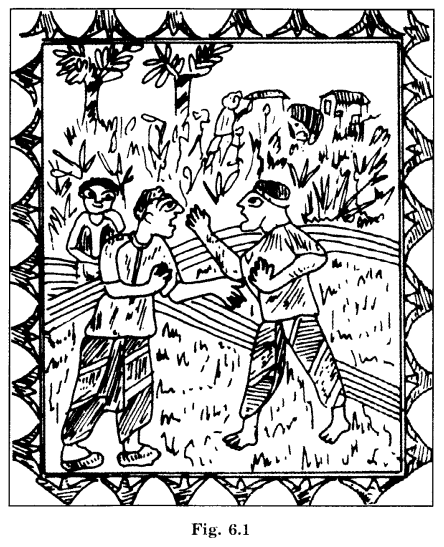
Area of the Police Station:
On the way to the police station one of the neighbours asked, “Why don’t we spend some more money and go to the main police station in the town?”
“It is not a question of money. We can register the case only in this police station because our village comes in its area of work,” explained Mohan.
Every police station has an area that comes under its control. All persons in that area can report cases or inform the police about any theft, accident, injury, fight, etc. It is the responsibility of the police of that station to enquire, to investigate and take action on the cases within its area.
Question Box: (NCERT Page 49-50)
- If there is a theft in your house which police station would you go to register your complaint?
- What was the dispute between Mohan and Raghu?
- Why was Mohan worried about picking a quarrel with Raghu?
- Some people said Mohan should report the matter to the police and others said he should not. What were the arguments they gave?
Answer:
- If there is a theft in our house we would go to the police station of our area to register our complaint.
- The dispute between Mohan and Raghu was that Raghu had shifted the bund of his agricultural field by a few feet into the fields of Mohan.
- Mohan was worried about picking a quarrel with Raghu because of the following reasons:
- Raghu was a big landlord, as his family owned many agricultural fields.
- He had resources at his disposal.
- His uncle was the sarpanch of the village.
- The arguments given by the people:
- He should report to the police
- The police would help him to force Raghu to retrace the bund.
- It would scold him.
- It would also send him to jail if he resists.
- • He should not report to the police:
- He would waste a lot of money.
- Nothing would come out of it.
- Raghu would have already contacted the police and it would scold Mohan.
- He should report to the police
Question 2.
When they reached the police station Mohan went to the person in-charge (Station House Officer or S.H.O.) and told him what had happened. He also said that he wanted to give the complaint in writing. The S.H.O. rudely brushed him aside saying that he couldn’t be bothered to waste his time writing down minor complaints and then investigating them. Mohan showed him his injuries but the S.H.O. did not believe him.
Mohan was puzzled and did not know what to do. He was not sure why his complaint was not being recorded. He went and called his neighbours into the office.
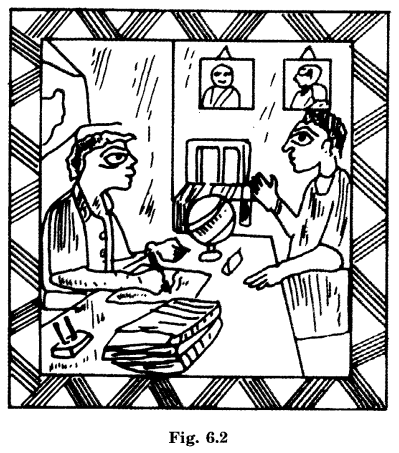
They argued strongly that Mohan had been beaten up in front of them and had they not rescued him he would have been injured very seriously. They insisted that the case be registered. Finally the officer agreed. He asked Mohan to write down his complaint and also told the people that he would send a constable the next day to investigate the incident.
Question Box: (NCERT Page 50)
(i) Show the above situation in the police station through a skit.
(ii) Then talk about how you felt playing Mohan’s role or that of the S.H.O. or the neighbours.
(iii) Could the S.H.O. have handled the situation differently?
Answer:
(i) Please see the skit in the story.
(ii) I felt very SQrry playing Mohan’s role, as no one in the police station helped me initially.
The S.H.O.’s role in the beginning was very disappointing. He should have behaved in gentleman’s tone. He should have tackled the situation in a very judicious manner.
The neighbours instead of going to the police station, should have gone to Raghu or the Village Panchayat to dissuade Raghu for giving back the portion of land to Mohan.
(iii) The S.H.O. could have handled the situation differently.
- He could have listened to Mohan patiently.
- He could have sent for Raghu to the Police station.
- He could have dissuaded Raghu to retrace his decision.
- He could have scolded Raghu without any fear or pressure.
Question 3.
You saw that Mohan and Raghu were arguing heatedly whether the common boundary of their fields had been shifted. Isn’t there a way by which they could have settled this dispute in a peaceful manner? Are there records that show who owns what land in the village? Let’s find out how this is done. (NCERT Page 51)
Answer:
- Yes, there is a way by which they could have settled this dispute in a peaceful manner:
- Mohan should have gone to Patwari first and got the fields measured.
- Mohan should have gone to the village panchayat.
- The Panchayat would have discussed the matter with Mohan and Raghu.
- The village members would have dissuaded Raghu and he would have retraced his step.
- He would have given back the occupied portion of land to Mohan.
- Yes, there are records that show who owns what land in the village. They are called land revenue records. They remain with the village Patwari.
- How land records are kept is given below:
- Patwari is officer who measures the land and keeps the land records.
- Patwari is called by different names in different states:
- Patwari
- Lekhpal
- Kanungo
- Karmachari
- Village Officer
- Patwari maintains and updates the land records:
- he uses a long chain for measuring land.
- he also collects revenue (lagaan or rent).
- he also informs the government about crops grown in his area.
Question 4.
Question Box: (NCERT Page 51)
(i) Find out the term used for the Patwari in your state:
(ii) If you live in rural area, find out
(a) How many villages does the Patwari of your area maintain land records of?
(b) How do people in the village contact him/her?
Answer:
(i) Patwari in Delhi: (Lekhpal in U.P.). in)
(ii) (a) A group of villages.
(b) The Patwari fixes the days in each village. Usually Panchayat President’s office is his office. People can contact him in this office.
Question 5.
The Khasra record of the Patwari gives you information regarding the map given below. It identifies which plot of land is owned by whom. Look at both the records and the map and answer the questions given below regarding Mohan and Raghu’s land.
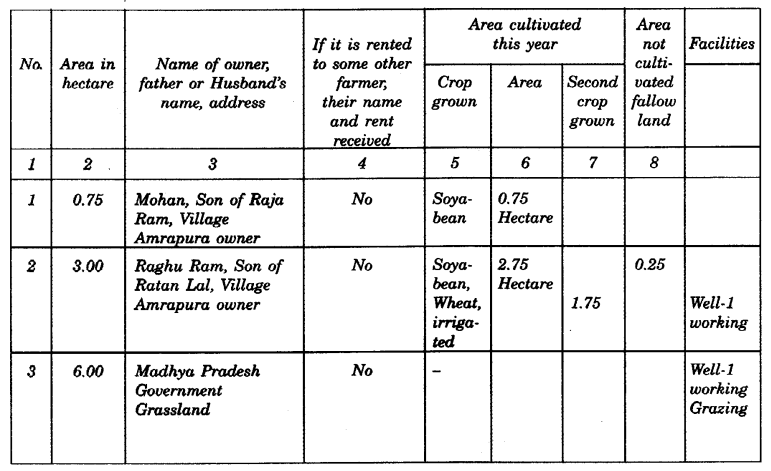
(See Fig. 6.3 on next page)
- Who owns the land south of Mohan’s field?
- Mark the common boundary between Mohan’s and Raghu’s lands.
- Who can use field no. 3?
- What information can one get for field no. 2 and field no. 3? (NCERT Page 52)
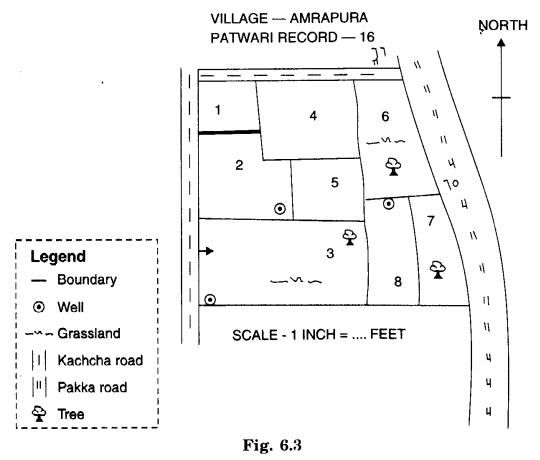
Answer:
- Raghu.
- The common boundary between Mohan’s and Raghu’s lands has been marked with thick line.
- No one except M.R Government.
- Field No. 2
- Raghu’s land.
- Crops grown—Soyabean, wheat.
- Irrigated land.
- Area 2.75 hectare
- Second crop grown on 1.75 hectare
- Fallow land 0.25 hectare
- Well 1-working.
- Field No. 3
- M.P. Government grassland
- Not on rent
- One well-working
- Used for grazing cattle.
Question 6.
When do you think farmers may require a copy of this record? Study the following situations and identify the cases in which these records would be necessary and why.
- A farmer wants to buy a plot of land from .another.
- A farmer wants to sell her produce to another.
- A farmer wants a loan from the bank to dig a well in her land.
- A farmer wants to purchase fertilizers for his field.
- A farmer wants to divide his property among his children.
Answer:
- Farmers may require a copy of this (land) record
- When they want to sell their land.
- When they give it on partnership.
- When they get crops raised on it.
- When they want to divide it among their heirs.
- When a farmer wants to buy a plot of land from another, he has to get his name entered in the revenue records after it has been registered in his name.
- Not required.
- The farmer will put the papers as mortgaged with the bank.
- Not required.
- He will require the records for dividing the land among his children and register the plots in their name as per divisions.
Question 7.
Other Public Services- A survey
This chapter has looked at some of the administrative work of the government, especially for rural areas. The first example related to maintaining law and order and the second to maintaining land records. In the first case we examined the role of the police and in the second that of the Patwari. This work is supervised by other people in the department, such as the Tehsildar or the Superintendent of Police. We have also seen how people use these services, and some of the problems that they face. These services have to be used and made to function according to the laws that have been framed for them. You have probably seen many other public services and facilities provided by various departments of the government.
Do the following exercise for your village/by visiting a nearby village or looking at your own area.
List the public services in the village/area such as: the milk society, the fair price shop, the bank, the police station, the agricultural society for seeds and fertiliser, the post office or subpost office, the anganwadi, creche, government school/s, health centre or government hospital etc. Collect information on three public services and discuss with your teacher how improvements can be made in their functioning. One example has been worked out. (NCERT Page 54)
Answer:
Public services in the village:
- Bank
- Milk Society
- Post Office
- Health Centre
- Fair Price Shop
- Govt. School
- Creche
- Govt. Hospital
- Milk Booth
- Vegetable Booth.
